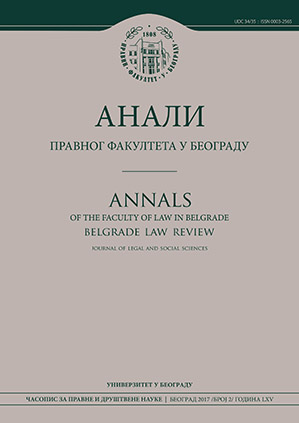ВРШЕЊЕ РОДИТЕЉСКОГ ПРАВА У СЛУЧАЈУ ОСПОРАВАЊА/УТВРЂИВАЊА ОЧИНСТВА ДЕТЕТА – ТРИ ПРИСТУПА НЕМАЧКОГ, ЕНГЛЕСКОГ И СРПСКОГ ПРАВА
EXERCISE OF PARENTAL RESPONSIBILITY IN THE CASE OF ESTABLISHING/CONTESTING PATERNITY– THREE APPROACHES: GERMAN, ENGLISH AND SERBIAN LAW
Author(s): Uroš NovakovićSubject(s): Civil Law, Human Rights and Humanitarian Law, Family and social welfare
Published by: Правни факултет Универзитета у Београду
Keywords: Child’s origin; Best interest of the child; Parental responsibility; Extramarital father; Right to respect for family life;
Summary/Abstract: Although the right to know his origin is envisaged, primarily, as a right of the child, decision establishing/contesting child’s origin applies to all parties in the proceedings – the child, the child’s mother, child’s father and the man whose paternity is being established. In most European legislations there are principles proclaiming equality of legitimate and illegitimate children. German law predicted, until modifications of the Bürgerliches Gesetzbuch in 2013, that if illegitimate mother refuse to give consent to illegitimate father, there is no possibility that he acquires parental rights or a right to contact with the child. German law considers that acquisition of the parental rights of illegitimate father against the will of the mother would be contrary to the best interests of the child. In England, when deciding parental responsibility order, courts consider following criteria: the degree of father commitment to the child, the degree of association between child and the father and the reasons illegitimate father seek parental responsibility order. The Serbian law (except time limit) provides no restrictions of biological father to establish origin in relation to the child and thus acquire parental responsibility. Serbian legislative solutions are completely in the line with the Convention on the Rights of the Child, but do not accept the right to respect for family life of the child and his legal father. The author suggests, in accordance with the obligation in Article 205 of the Serbian Family Act – extended application of investigative principle within the family (paternity) proceedings, that courts in Serbia, questioning request of the man who challenged marital paternity or disputed recognized illegitimate paternity, and intends to acquire parental responsibility examine the reasons due to which he submitted this request. This would further fulfill an obligation of the court to examine best interest of the child principle in all proceedings concerning child (art. 6 and 266 of the Serbian Family Code), thus to allow or refuse exercise of parental responsibility, primarily from the perspective of the child’s stability.
Journal: Анали Правног факултета у Београду
- Issue Year: 65/2017
- Issue No: 2
- Page Range: 131-161
- Page Count: 31
- Language: Serbian

